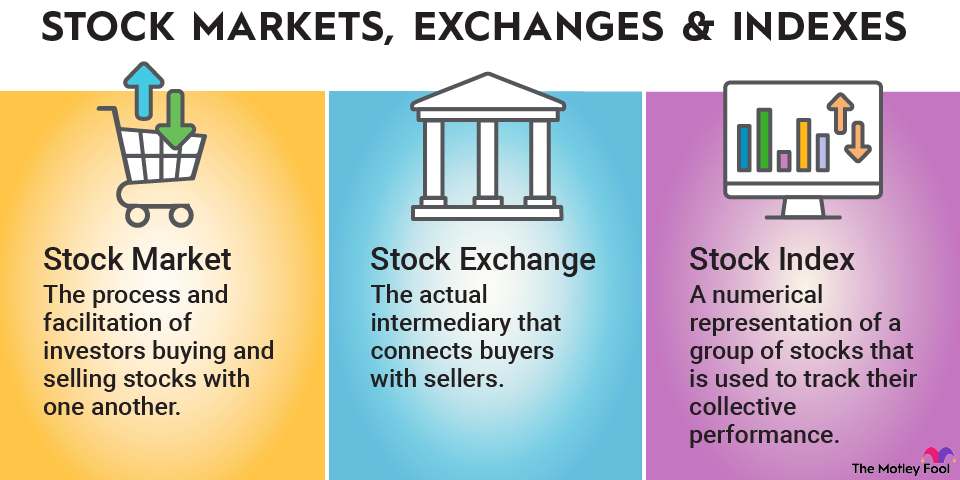There are thousands of publicly traded companies you can invest in, not to mention the many exchange-traded funds (ETFs) and mutual funds you can buy. So it's not surprising that many investors don't know where to start. Even with a market near an all-time high in early 2026, many stocks remain extremely attractive for long-term investors to consider buying.
Publicly Traded Company
But what are the best stocks to buy in January 2026? Although I can't consult a crystal ball that tells me what stocks will deliver the best returns, I've tried to do the next best thing. In this article, I'll discuss 10 stocks that I think could be great buys for long-term investors looking to put their money to work.

Why these 10?
Before we get to the stocks, let's acknowledge three caveats:
- Choosing the best stocks to buy today depends on your personal financial situation. To get a feel for where you stand, read our guide on how to invest in stocks. It walks you through topics such as establishing an emergency fund, allocating assets, and choosing the right stocks for you.
- I like these stocks as long-term investments, even if a market crash or bear market arrives. I have absolutely no idea what they'll do over the next few weeks or months. In fact, if inflation unexpectedly spikes higher, trade tensions escalate, or the U.S. falls into a deep recession, it's entirely possible that most or all of them could soon decline.
- Although I ensured some variety, the list below isn't meant to be a fully diversified portfolio. Instead, these are my highest-conviction long-term stocks to invest in now. The most effective way to diversify your holdings is to build the core of your portfolio around a fund like the Vanguard Total World Stock Index Fund ETF (VT +0.66%) or the Vanguard S&P 500 ETF (VOO +0.67%).
Now, let's get to my list of the 10 best stocks to buy and hold for the long term, followed by the summarized investment thesis for each.
| Name and ticker | Current price | Market cap | Industry |
|---|---|---|---|
| PayPal (NASDAQ:PYPL) | $57.69 | $53.9 billion | Diversified Financial Services |
| Airbnb (NASDAQ:ABNB) | $139.33 | $84.4 billion | Hotels, Restaurants and Leisure |
| CrowdStrike (NASDAQ:CRWD) | $470.95 | $118.6 billion | Software |
| MercadoLibre (NASDAQ:MELI) | $2,178.41 | $110.4 billion | Multiline Retail |
| Intuitive Surgical (NASDAQ:ISRG) | $586.59 | $207.8 billion | Healthcare Equipment and Supplies |
| Shopify (NASDAQ:SHOP) | $164.51 | $214.1 billion | IT Services |
| Walt Disney (NYSE:DIS) | $115.84 | $206.9 billion | Entertainment |
| Berkshire Hathaway (NYSE:BRK.B) | $499.77 | $1.1 trillion | Diversified Financial Services |
| Amazon (NASDAQ:AMZN) | $247.52 | $2.6 trillion | Multiline Retail |
| Alphabet (NASDAQ:GOOGL) | $328.75 | $4.0 trillion | Interactive Media and Services |
Pitches for each stock
Now that you've seen my top 10 best stocks to buy now, you may be wondering why I picked each company. Here's a quick rundown of why I'm such a fan of each as a long-term stock to invest in.
1. PayPal

NASDAQ: PYPL
Key Data Points
PayPal (PYPL -1.00%) is an absolute cash machine that is down by about 80% from its highs. If you aren't familiar with the recent history, PayPal completely overhauled its management team in late 2023. Every member of its C-suite is new to the business, and it is an impressive group.
The new leaders have already made significant moves, including introducing an industry-leading cash-back debit card product and launching an advertising platform. PayPal announced an agreement with OpenAI in late 2025 to become the first digital wallet integrated into ChatGPT. Since the new leadership took over, efficiency has improved dramatically, and earnings per share (EPS) is significantly higher.
This could be just a starting point. Management presented investors with a growth roadmap in early 2025, which showed that the team believes it can achieve sustainable 20% annual earnings growth in the not-too-distant future.
The company has 434 million active users across PayPal and Venmo, and it processes about $1.9 trillion in annualized payment volume. It also generates more than $6 billion in free cash flow annually and has been using it to aggressively repurchase its own stock, a sign that management believes it's undervalued.
It's not hard to see why PayPal's management is choosing to use its capital this way. As of January 2026, the stock traded at a historically low price-to-sales (P/S) ratio of less than 1.7 times trailing-12-month sales and for just over 10 times forward earnings.
2. Airbnb

NASDAQ: ABNB
Key Data Points
Few companies have been as successful in disrupting an entire industry as Airbnb (ABNB +0.48%). The company began in 2007 with a few air mattresses on the floor of the co-founders' apartments (from which the company derives its name) and has since evolved to become a leader in changing the way millions of people view travel accommodations.
Airbnb has more than 5 million hosts who list over 8 million properties and experiences on its platform. In the third quarter of 2025, more than 133 million nights and experiences were booked on Airbnb's platform, with a total booking value of $22.9 billion, which represents 14% year-over-year growth.
Airbnb is not only massive and growing quickly but also highly profitable. It generated $4.5 billion in free cash flow and had a 38% FCF margin over the four quarters ending Sept. 30, 2025.
Looking forward, Airbnb has $11.7 billion in cash and short-term investments on its balance sheet. And it still has a massive growth opportunity.
Its overall market opportunity is estimated to be in the trillions of dollars, encompassing both short-term and long-term stays, as well as experiences. Additionally, management appears to believe that the stock's valuation doesn't accurately reflect the long-term opportunity, given that the company has been buying back shares at a relatively aggressive pace.
3. MercadoLibre

NASDAQ: MELI
Key Data Points
One of my favorite long-term stock investments in the market, MercadoLibre (MELI +0.01%), is often referred to as the Amazon of Latin America, and for good reason. The company operates an e-commerce marketplace with a dominant presence in some of the region's most populous nations, including Brazil and Argentina.
However, there's a lot more to MercadoLibre. It operates a fast-growing payments platform called Mercado Pago, a logistics service known as Mercado Envios, a business lending platform, and more.
The marketplace saw $16.5 billion in merchandise volume in the third quarter of 2025, representing a 28% increase over the same quarter in 2024. Mercado Pago processes almost $285 billion in annualized payment volume, with three-quarters of this volume coming from outside the company's e-commerce platform.
Both main parts of the business are experiencing rapid growth. And don't overlook Mercado Crédito, the company's young but fast-growing (and highly profitable) lending business. Mercado Crédito has $11 billion in outstanding loan balances.
MercadoLibre isn't just the Amazon of Latin America -- it's the Amazon, PayPal, Block (XYZ -0.87%) (owner of Square and Cash App), Shopify, and more, all rolled into one. And it's in a much earlier stage of growth. As the e-commerce and fintech landscapes in Latin America evolve over the coming years, MercadoLibre could be a major long-term beneficiary.
E-commerce
4. CrowdStrike

NASDAQ: CRWD
Key Data Points
It seems like every week, there's another high-profile security breach. The need for cybersecurity solutions certainly isn't getting any smaller. And that's especially true when it comes to cloud-based security. CrowdStrike (CRWD +1.53%) is leading the charge to keep data secure in the cloud. This is a best-in-breed cybersecurity company with a highly effective platform.
CrowdStrike collects security data from its numerous users, analyzes it, and utilizes it to automate security across its entire network. This makes the platform highly effective at detecting the newest threats.
And the more users adopt CrowdStrike's solutions (known as its Falcon platform), the more effective it becomes. The use of crowdsourced threat data, combined with its leading market share, gives it a competitive advantage over peers.
With almost $5 billion in annual recurring revenue and an 80% subscription gross margin, CrowdStrike's growth has been impressive, but this could be just the beginning. The company sees its current addressable market at $116 billion in potential revenue and expects that the opportunity could more than double to $250 billion by 2029.
5. Intuitive Surgical

NASDAQ: ISRG
Key Data Points
Robot-assisted surgery beats shaky human hands. That general thesis hasn't changed significantly since I first noticed Intuitive Surgical (ISRG +0.26%) stock in 2005. The da Vinci Surgical System is the clear market leader, and its "razor and blades" model helps Intuitive generate a recurring stream of revenue.
In the third quarter of 2025, Intuitive Surgical reported year-over-year revenue growth of 23%, fueled by 20% growth in performed da Vinci procedures. Intuitive Surgical is a dominant player in its space, with a global market share of approximately 80%.
It has lots of room to grow as the adoption of its surgical systems and the number of supported procedures increase over time. This is particularly true in many international markets, where the implementation of robot-assisted surgery could be a long-tailed growth catalyst for this excellent business for decades to come.
6. Shopify

NASDAQ: SHOP
Key Data Points
Shopify (SHOP -2.24%) operates a platform designed to enable businesses of all sizes to sell their products online, with a particular focus on empowering smaller businesses and growing with them by establishing long-term relationships. Shopify offers a subscription plan starting at $39 per month for businesses (even less for one-person merchants).
The company also provides many adjacent services that help businesses operate smoothly, such as payment processing solutions and logistics. Shopify's one-stop-shop approach to enabling e-commerce has turned it into a powerhouse. It now has more e-commerce sales flowing through its ecosystem than any company besides Amazon, and Shopify could be just getting started.
The platform has generated almost $11 billion in revenue over the past four quarters. However, this is just a fraction of its estimated $153 billion (and growing) market opportunity as more retailers shift their focus to online sales.
E-commerce is still in the relatively early stages, making up slightly more than 16% of retail sales in the United States. Shopify's platform has the No. 2 share of e-commerce by total payment volume (second only to Amazon), giving it a powerful ecosystem with network effect advantages over competitors.
7. Walt Disney

NYSE: DIS
Key Data Points
The House of Mouse is like the all-weather tires of a portfolio. The pandemic hurt its theme park and movie businesses but helped the Disney+ streaming service, which has grown into a powerhouse years earlier than Disney (DIS +1.46%) expected.
In fact, six years after launching, Disney+ Core now has more than 130 million paid subscribers, while Hulu adds tens of millions more. Additionally, the market is absorbing price increases with minimal impact on subscriber counts, and Disney's streaming business is now profitable.
While consumers are clearly feeling the pressure of inflation, demand for Disney's theme parks, movies, and cruise line has been strong. In fact, per-guest revenue in Disney's parks is far greater than in comparable pre-COVID-19 pandemic times, thanks to initiatives that have driven higher in-park spending. Additionally, the company is investing $60 billion over the span of a decade in its theme parks and cruise line to ensure they remain full for the foreseeable future.
With Disney also laser-focused on the profitability of Disney+ and its other streaming platforms, Hulu, and ESPN+, this could be a powerful combination of profitable, all-weather revenue streams. In a nutshell, Disney might be the ultimate combination of an in-person experiential stock and a tech-focused growth business.
Disney's amazing stable of intellectual properties (the Marvel Cinematic Universe, Star Wars, ESPN, Pixar, etc.) and its cash-machine theme park business give it a margin of safety that makes it perhaps the safest stock on this list. And it still maintains tremendous profit growth potential as newer areas of its business evolve.
8. Berkshire Hathaway

NYSE: BRK.A
Key Data Points

NYSE: BRK.B
Key Data Points
Although most of this list is made up of growth stocks, or at least stocks that have some exciting growth drivers, this is the relatively boring value pick of the bunch (but in the best possible way). Berkshire Hathaway (BRK.A -0.30%) (BRK.B +0.00%) owns a collection of about 60 subsidiary businesses, including household names such as GEICO, Duracell, and Dairy Queen, to name just a few.
Berkshire also owns a portfolio of common stocks -- worth about $315 billion as of December 2025 -- that includes massive stakes in Apple (AAPL +0.19%), Bank of America (BAC -0.59%), Chevron (CVX +1.80%), American Express (AXP -1.92%), and Coca-Cola (KO +1.64%), as well as positions in dozens of other companies.
Many were particularly savvy investments, such as the Bank of America stake, which resulted from a preferred stock deal made in the wake of the financial crisis. In addition to its businesses and stock portfolio, Berkshire also had approximately $380 billion in cash and short-term investments as of September 30, 2025, providing it with considerable financial flexibility to capitalize on opportunities as they arise.
Berkshire is putting some of that cash to work, agreeing to buy Occidental Petroleum's (OXY -0.80%) petrochemical unit, OxyChem, in October 2025 for $9.7 billion. That's its biggest deal since 2022, when Warren Buffett's company bought insurance company Alleghany for $11.6 billion.
Berkshire continues to produce market-beating returns in most years despite its massive size. And while Berkshire certainly won't produce the roughly 20% annualized return it has produced from the time Buffett took the helm in 1964 through the end of 2025, there's no reason to believe it won't continue to outpace the S&P 500 (^GSPC +0.65%) index for the foreseeable future.
In fact, the company recently reached an impressive milestone by becoming the first non-technology company to reach a trillion-dollar market cap. Buffett recently stepped down as CEO, but the company is in good hands. Berkshire's winning culture is likely to live on for decades, even in its post-Buffett era.
9. Amazon

NASDAQ: AMZN
Key Data Points

NASDAQ: GOOGL
Key Data Points
Alphabet isn't exactly a household name, but its main subsidiary, Google, certainly is. And there's a lot more to the business and its potential than the massive internet search operation that has a dominant market share.
Google is divided into two main segments: Google Services and Google Cloud. Google services include YouTube, Google Play, Gmail, Android, Chrome, and the Nest smart-home products. This part of the business makes most of its money from advertising, but there's also significant revenue from hardware (Nest) and in-app purchases (Google Play).
Google Cloud is the company's cloud services division, holding the No. 3 market share behind AWS and Microsoft Azure. It has been growing its market share in recent years, and the cloud infrastructure market itself is forecast to quadruple by 2030. So, while this accounts for approximately 10% of the company's revenue today, it could be the biggest growth driver for years to come.
Additionally, Alphabet has a segment called "Other Bets," which owns several promising early-stage businesses. The self-driving vehicle technology company Waymo is perhaps the most notable and has a clear market lead in the young robotaxi industry. While none of the "other bets" companies produce any significant revenue yet, there's a lot of long-term potential.
Not only is there tons of growth potential, but Alphabet is also extremely profitable and has a substantial amount of cash. In fact, this has recently prompted Alphabet to initiate its first-ever dividend payment.
How to buy best-performing stocks
Fortunately, modern-day brokers have made buying stocks like these easy. Just go through these steps:
- Open your brokerage app: Log in to your brokerage account where you handle your investments.
- Search for the stock: Enter the ticker or company name into the search bar to bring up the stock's trading page.
- Decide how many shares to buy: Consider your investment goals and how much of your portfolio you want to allocate to this stock.
- Select order type: Choose between a market order to buy at the current price or a limit order to specify the maximum price you're willing to pay.
- Submit your order: Confirm the details and submit your buy order.
- Review your purchase: Check your portfolio to ensure your order was filled as expected and adjust your investment strategy accordingly.





















